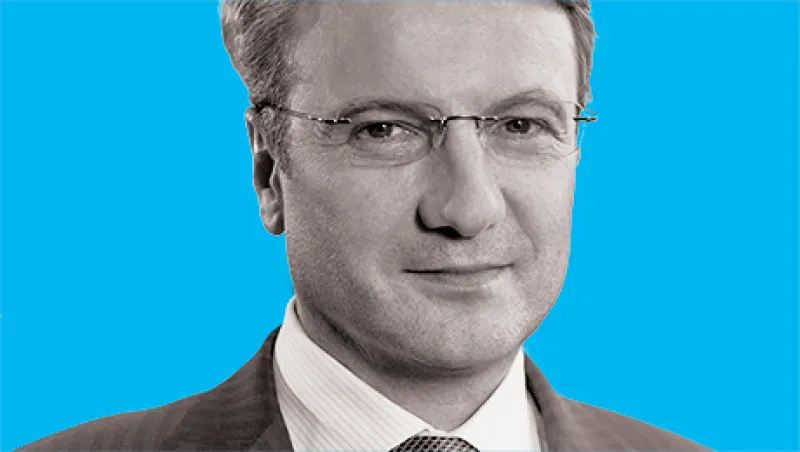Herman Gref enjoys unique standing in today’s Russia. An outspoken advocate of economic reform in an increasingly authoritarian political environment, he’s the market-friendly chair and CEO of the nation’s largest financial institution, Sberbank, which remains profitable in the midst of a two-year economic crisis.
Gref rose to prominence in government and business by impressing future president Vladimir Putin during the 1990s, when both were ambitious junior officials in St. Petersburg’s municipal administration. In 2000, Putin, who had just succeeded Boris Yeltsin as president, appointed Gref minister of Economic Development and Trade. After presiding over an eight-year burst of economic growth, Gref took over as chief executive of Sberbank, then a stodgy Soviet-style savings bank, and turned it into a modern powerhouse offering the full range of retail and wholesale services.
Thanks in large part to its 40 percent market share, Sberbank continues to thrive despite the impact of global sanctions following Russia’s intervention in Ukraine and the price collapse of oil and gas, the country’s main source of revenue. During a recent visit to meet investors in New York, Gref, a youthful, gym-fit 52, sat down on a cold Saturday morning for a breakfast interview with Institutional Investor.
Can Russia’s economy grow if oil prices remain below $35 a barrel?
Last year the economy shrank by 3.7 percent, and this year our forecast is for another decline of 1.5 to 2 percent, which is more pessimistic than the consensus of –0.9 percent. Next year, if oil prices increase to $45, we may grow 0.5 to 1 percent. But we need reforms that lead to a diversification of the economy away from its dependence on oil and gas. We have to create a radical change in the investment climate. The first and most important measure is to protect property rights and to reform the judicial system involved with that issue. We also need tax reforms that encourage more investment. We must eliminate bureaucratic red tape, beginning at the top federal level. And these reforms must get under way within the next three years.
Do you convey these views to President Putin?
I speak out publicly about these ideas. I do not have frequent meetings with the president. But whenever I can, I convey my views to government officials, including the president. I see this as a first step in gaining acceptance for reforms.
In the wake of international sanctions linked to Ukraine, the low oil prices and the falling ruble, how has Sberbank’s strategy changed over the past two years?
In a first stage, we focused on further cost cutting. We had already accomplished a lot before 2014, but we found significant other areas to cut back. Over the past two years, we closed 1,500 of our 18,000 branches. Our online and mobile banking transactions are increasing 20 to 30 percent annually. But the number of customers at our branches grew by 14 percent in 2014 and by 8 percent last year because a lot of other banks are in trouble and people are moving their accounts to Sberbank. That’s why we cannot reduce our branch network more quickly.
By 2018 we intend to reduce our operational costs by an additional $1 billion annually. We are also reviewing our risk management with the aim of increasing the quality of our assets. And we can already see results. The nonperforming loan rate for the Russian banking sector as a whole is 2.5 times higher than ours.
Last year we finished the installation of a single centralized IT platform to replace the 17 previously existing ones. This was a huge step forward, but it isn’t nearly enough. If we want to survive in the long term against the financial services that will be offered by Google, Amazon and Apple, we need an IT platform that is cloud-based and open-sourced. And we intend to create one by 2018. By that year we also expect to increase our return on equity, which is now 11.8 percent, to 18 percent.
Abroad we will retreat from smaller markets and focus on the bigger, more profitable countries like Turkey. In Europe we will shrink the traditional branch network and move forward with digital banking.
Sberbank is still majority-owned by the Central Bank of Russia. What possibility is there that it will become a private sector bank as you have long advocated?
It won’t happen anytime soon. President Putin said that Sberbank will be excluded from the list of state companies that will be privatized in the next two years. There are many politicians in the parliament who say Sberbank would receive a very low price at this point in the economic crisis. Also, the banking sector needs stability. Many banks have been forced to close down. So maybe it would be more realistic to restart the discussion of privatizing Sberbank in two or three years. I still think privatization would be a good idea.
You have run Sberbank for more than eight years and were minister of Economics and Trade for eight years before that. Would you consider returning to government?
I was probably subjected to more criticism than any other official when I was in government, and I wouldn’t want to go through that experience again. I have promised investors that I won’t leave Sberbank until we are satisfied with its modernization and efficiency and have a good succession plan in place. Afterward I want to go into business. But that’s in God’s hands.






